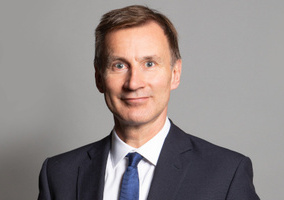The word ‘charity’ does not appear once in last Thursday’s 70-page autumn statement, and civil society was noticeably absent from chancellor Jeremy Hunt’s accompanying speech.
Prior to the statement, charities had warned against mooted big cuts to public service budgets and wanted to see benefits, pensions and the minimum wage rise in line with inflation.
In these respects, the chancellor granted the sector's wishes, as he refrained from cutting spending plans as much as feared and committed to welfare and pay increases from next April.
Nonetheless, there were other areas in which the sector's calls were left unanswered.
Delay to EU replacement funding
Hunt did not mention the Shared Prosperity Fund (SPF), which was created to replace the European Social Fund (ESF) post-Brexit.
In the Spring statement this year, £400m was put aside for SPF in 2022-23, with the first payment to local authorities expected in October.
However, this figure is noticeably absent from the autumn statement's updated spending plans. It is unclear whether underspend of £400m will be reclaimed by the government or necessitate further flexibility with the funds.
And last month, charities warned that ESF-funded employability programmes were closing already due to the gap between EU funding ending and its replacement being introduced.
The Institute for Public Policy Research said the government's delay in spending the £400m “will mean that the proportion of funding lost to inflation is now greater, given double digit inflation is expected to continue into the new year”.
Meanwhile, future commitments of £600m in 2023-24 and £1.3bn for the following financial year remain, but the IPPR warned that the government's failure to uprate these will mean that money will be lost to inflation.
Charities energy concerns to be included in review
Earlier this year, charities received a discount on their energy bills for six months. This is set to stop on 31 March 2023, and charities urged clarity in the autumn statement on what support they would receive post-March.
Hunt failed to provide such reassurance but on the same day as the statement, the government released information on its review into the energy relief scheme and might determine where further help is needed.
Since Hunt's appointment, the Treasury had been unclear whether it would consider charities' and other organisations' responses to a consultation run by the Department for Business, Energy, and Industrial Strategy (BEIS).
Last week, however, it finally confirmed that it would. "The review will consider [...] Evidence from businesses, suppliers, and market experts, which is being collated by the Department for Business, Energy, and Industrial Strategy," it said.
The document adds: “The government recognises that some businesses, such as those which are highly exposed to energy prices and unable to pass through or absorb these costs sufficiently, may continue to require support beyond March 2023. However, the overall scale of support the government can offer will be significantly lower, and targeted at those most affected to ensure fiscal sustainability and value for money for the taxpayer.”
The review of the scheme, being conducted by the Treasury, will examine its effectiveness, determine which non-domestic customers remain particularly vulnerable to energy price rises and what barriers exist to those businesses absorbing increased energy costs and their ability to adjust to higher prices.
Shrunken aid budget to remain
Bond, the umbrella body for NGOs, had called on the government to increase the aid budget so it could pave the way to a return to 0.7% of Gross National Income (GNI).
However, Hunt said that it would not be possible for the government to increase the current UK’s ODA from 0.5% of GNI back to the recommended 0.7% until fiscal rules have been met.
The budget cut to 0.5% was made two years ago as a “temporary measure” during the pandemic, which would be reviewed as the fiscal situation changes.
The UK is the only G7 country that cut its aid budget in the middle of the pandemic, leading some charity leaders to ask whether it was strictly necessary.
The reduction in GNI means 0.5% is considerably less money going to humanitarian aid. This was a sentiment echoed by Andrew Mitchell at the Tory party conference weeks before he was reinstated as minister of state for the foreign, commonwealth and development office (FCDO).
He openly criticised the government’s handling of the aid budget at the conference. Hopefully, this can be translated into government so aid charities can feel more supported.
In 2021's autumn budget, our current prime minister Rishi Sunak announced the plan to increase the aid budget back to 0.7% in 2024-5.
What was in the budget that will benefit charities?
Many of the benefits for charities from the autumn budgets were indirect, as they were commitments that will help their beneficiaries through public services, thus alleviating demand from the sector.
The Household Support Fund, which was supposed to be a short-term financial support scheme set up last October, has been extended by at least 12 months in the new budget.
The fund is available to local councils to allocate to people who need help with essential costs – but some charities have criticised its effectiveness.
Morgan Wild, the head of policy at Citizens Advice, called the fund “a plaster on a gaping wound” whereby it helps people experiencing serious financial shortfalls “for a few weeks – but there’s little to address the fundamental issue”.
Peter Matejic, deputy director of evidence and impact from Joseph Rowntree Foundation, called the fund a “useful adjunct to the benefits system” but said it is not “a substitute for an adequate level of benefits”.
Increase in adult social care funding
Hunt announced that £1bn would be allocated to adult social care next year and £1.7bn the year after that.
An additional £3.3bn is to be invested into the NHS for 2023-4 and 2024-5 to alleviate the pressure on it, as it still reels from the pandemic.
Lucy Seymour-Smith, head of policy and influencing at the Voluntary Organisations Disability Group (VODG) welcomed the increase in funding to the social care sector as well as the planned increase to the national living wage.
However, she stressed that without increasing the pay of social care workers, the recruitment and retention crisis in the sector would remain.
Seymour-Smith added that the forthcoming local government finance settlement must be sufficiently resourced as VODG are concerned about the absence of additional funding to enable local authority and health commissioners to secure local services at rates that meet rising costs.
Benefits raised in line with inflation
The government committed to raising various benefits in line with inflation – something charities like the Joseph Rowntree Foundation, Citizens Advice and more have been campaigning for for most of this year.
Universal Credit, pension credit and state pensions will be going up by 10.1% next April. While the uprating in benefits with inflation is welcome, anything less would have been real terms cut.
This takes further pressure off charities who are already plugging in the gaps from a stripped-down welfare state, as food bank usage has almost tripled in the last year.
But overall, despite some welcome announcements, concerns remain over how charities will be able to cope with increasing demand for their services along with higher energy costs and potentially scarcer donations.
In a snap analysis of the autumn statement, Pro Bono Economics estimated that the UK's charity sector income is due to decline by £2.2bn in real terms by the end of 2023-24 due to rampant inflation.
Jane Ide, the chief executive of ACEVO, responded to the statement by asking how much more the charity sector can take.
“Across our sector, charities will be continuing to raise their concerns about the impact of the cost-of-living crisis on the people they serve. They will continue to try to deliver that desperately needed support. But they will be wondering how much more demand they can absorb, and what happens when even the safety net our sector provides can cope no more.”
Related articles











